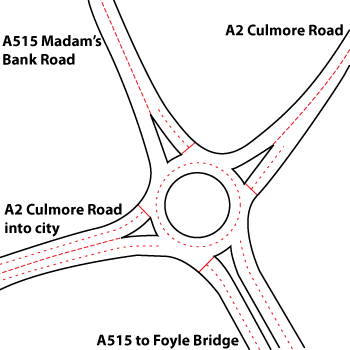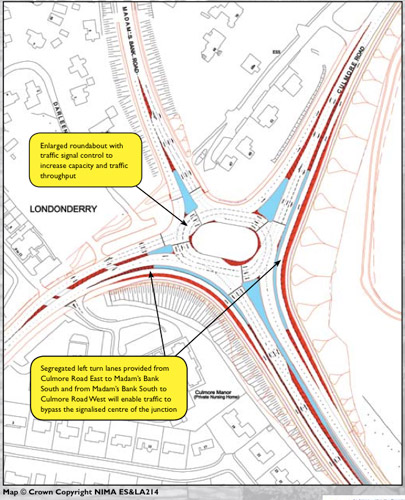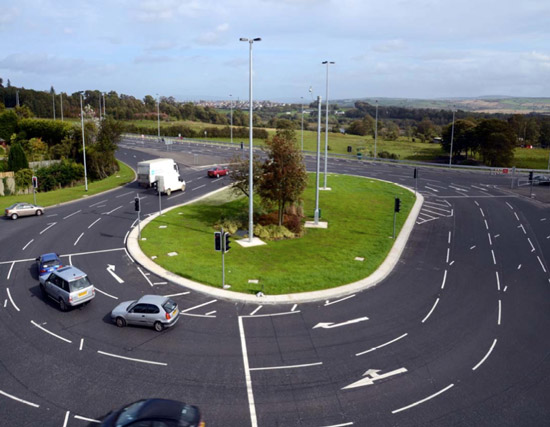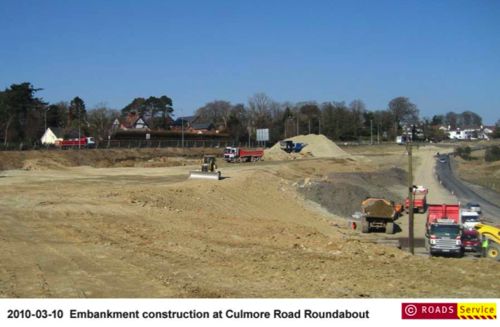|
|
Status
|
Construction scheme
(completed)
Contractor Phase 1: PT
McWilliams Ltd
Contractor Phase 2:
Whitemountain Quarries Ltd
|
|
Where
|
To
enlarge and signalise the Culmore
roundabout, Derry |
|
Total
Length
|
n/a |
|
Dates
|
Scheme announced 8 Sep
2009
Phase 1 began Jan 2010
Phase 1 completed Apr
2010
Phase 2 began during
March 2011
(changed
from "late 2010" as of July 2010)
Construction due to
take 20 weeks (as of Dec 2010)
Junction completed and
activated 14 Aug 2011
Officially opened 13 Oct 2011
|
|
Cost
|
£1.1m for phase 1
£1.65m for phase
2
(£2.3m to be funded by Intereg)
|
|
Photos
|
See below. |
|
See
Also
|
General
area map - Google Maps
A515
Madam's Bank Road widening scheme -
on this site
|
Derry city is bypassed on the east and north by a
succession of roads that form a continuous route -
the A514 Crescent Link, the A515 Foyle Bridge, the
A515 Madam's Bank Road and the
recently-constructed A515 Skeoge Link. The Culmore
Road roundabout is one of the biggest bottlenecks
on this route, lying half way along Madam's Bank
Road. It connects to the A2 Culmore Road, one of
the main arteries into the city from the north
(see map).
The original
arrangement (built in the early 1980s) was a
conventional two-lane roundabout, ie without
traffic lights as shown in the sketch map below
(not to scale). However, traffic congestion here
is significant, especially on the two ends of
Culmore Road, and it was clear that something had
to be done to improve flows.

Original
arrangement of Culmore Road roundabout.
The plan is to expand
the roundabout to the east and turn it into a
signalised gyratory junction, as shown in the
Roads Service map below. A "gyratory" is a road
that is a bit like a roundabout, but is NOT a
roundabout because traffic lights create different
priorities than you would find on a true
roundabout. The roundabout will be three lanes
wide. There will also be two dedicated free-flow
"jet lanes" (lanes that allow vehicles to bypass
the roundabout) from the Foyle Bridge direction
left onto the Culmore Road into the city, and from
the rural end of Culmore Road left onto the Foyle
Bridge. A related
but separate scheme will see Madam's Bank
Road north of this roundabout widened to two lanes
in each direction.

Map of
improved Culmore Road roundabout, taken from this
PDF file
which was released to the public in late March
2011. [Roads Service map]
The scheme was announced
in September 2009, and the contract for Phase 1
was signed in December 2009. Phase 1 consists of
constructing the enlarged embankment for the new
roads, as well as diverting some local access
roads. According to Roads Service, private
developers contributed a significant proportion of
the £1.1m cost of this phase. Phase 2 will
involve construction of the road itself and is
expected that the contract for this part will be
signed in late 2010.
Progress
9 Nov 2011:
The front cover of Roads Service's Autumn Council
Report to Derry City Council, just
released, contains a fabulous photo of this
scheme. The spiral lane markings are very obvious.

Culmore Road roundabout, ca Sep 2011. [Roads
Service, see link above for source]
30 Oct 2011:
The junction was officially
opened by Regional Development Minister
Danny Kennedy on 13 October 2011, although it had
by then been in use for two months. The total cost
of the scheme is given as £2.75m. If we
assume that refers to Phases 1 and 2 taken
together, then that means that just over 80% of
the cost was funded by Intereg.
The Minister said: “The roundabout, which lies on a key
strategic route, has over 45,000 vehicles per
day passing through it and is an important
junction for motorists. The completion of the
Culmore junction has removed a significant
obstacle to motorists at peak times of the day.
The new signalised roundabout has eased
congestion at this key junction, resulting in
improved safety and journey times for traffic
travelling this route.” The small number
of complaints that were made after opening (see
below) do not seem to be borne out judging by the
silence that has followed since then.
20 Aug 2011: The junction was
indeed fully switched on and opened to traffic on
14th August, although the two jet lanes did not
open straight away. This was perhaps to let Roads
Service monitor how the new junction worked
without the added complication of fast-moving jet
lanes to surprise drivers still getting familiar
with the junction. A nice job all round.
Not everybody is happy. The driver quoted in
this piece clearly does not understand the
difference between a gyratory junction and a
conventional roundabout, or indeed that
gyratories are an extremely common and
time-proven design in the UK. In many instances
they operate much more efficiently than a
straightforward signalised crossroads, since
they allow multiple flows to run simultaneously,
increasing the capacity of the junction. They
are found in many places in Northern Ireland -
eg Broadway at the end of the M1; York Street
interchange in Belfast; Tillysburn on the
Sydenham Bypass, although admittedly they were
not well known in Derry until now. The
implication in the article that a proper
junction only has "one" set of traffic lights is
complete nonsense. Roads Service correctly point
out that the design of the junction is such that
it would be unsafe to operate it without lights,
and also that peak time congestion would likely
be worse without them.
12 Aug 2011: According to a
report on BBC Foyle, the upgraded Culmore Road
"roundabout" is due to be opened fully on Sunday
14th August, marking the end of a two-phase
project which began 20 months ago.
23 July 2011: This press
release issued five few days ago suggests
that the scheme will be completed in "mid August",
which is great news if it means the upgraded
junction will be operational for the schools going
back. Meanwhile, the contract for the adjacent Madam's Bank
Road widening scheme has now been awarded.
14 May 2011: Roads Service have
now published an
updated map of the road layout on their web
site). This shows the planned arrangement of lanes
on the finished junction, which will be "spiral"
lane markings (markings that guide traffic towards
the edge of the roundabout as they go round, so
they can safely turn off without having to change
lanes). The contractor, Whitemountain Quarries
Ltd, continues to work on this scheme.
25 Apr 2011: Work on this scheme
got underway in March, and there is now evidence
of a lot of activity. This is the final phase of
the scheme which will see an enlarged signalised
gyratory junction replace the current roundabout
by the end of the summer.
10 Feb 2011: The contract for
phase 2 of this scheme was awarded yesterday to
Whitemountain Quarries Ltd. According
to the Minister work is due to begin in
March and be completed "by the end of the summer",
which we can assume means the end of August.
14 Jan 2011: In the minutes of a
Roads
Service Board meeting on 30 November it has
been revealed that they have been successful in
applying for "up to £2.278m" from the Interreg
4A scheme to go towards phase 2 of
this scheme. It's not clear whether this is the
full cost or only part of it. It's also not clear
whether the cost
cutting announced yesterday will impact on
this scheme. As this is not a strategic scheme,
however, it may well be unaffected.
12 Dec 2010: The contract for
phase 2 of the scheme is now out to tender
and will close on 23rd December. The tender
anticipates that work will begin in February 2011
and last "no longer than 20 weeks". By this
timetable we could therefore expect completion no
later than mid July. No cost estimate is given for
phase 2.
12 Sep 2010:
Phase 1 was carried out during the first four
months of 2010 (see photo below). The rock
embankment is now waiting and ready for the road
itself. According to a meeting
with Derry City Council on 6 July 2010, "[Roads
Service said] that the £1.1m used to put new
embankment in place at the roundabout had to be
spent by March [2010], and that further funding
for additional work on the roundabout was not yet
available. [Roads Service] stated that [they] had
been confidentially assured that funding would
soon be released for the scheme’s completion from
Intereg cross border funding." Thus we
would anticipate construction on the new
roundabout either later this year, or early in
2011.

The new embankment under
construction in March 2010. [Roads Service image
from here]
|

